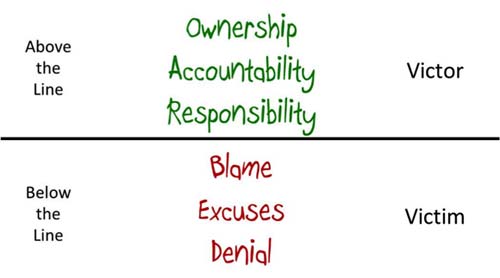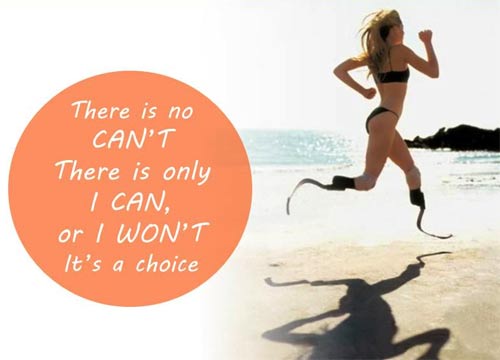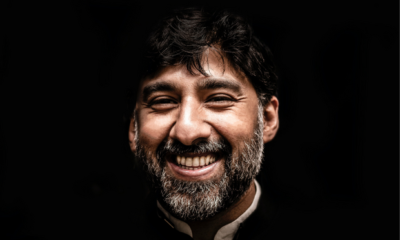Life
3 Effective Ways To Take Your Life To The Next Level
In my experience of coaching and counselling, I have found that the number one limiting belief that people hold is that they are not in control of their lives.
People give me their tales of woe, and implore: “but I CAN’T do it”. There is always a compelling reason excuse as to why they are not living their ideal life. Apparently, it’s their genetics; it’s the government; it’s the demands of their job; it’s their wife; it’s the financial climate; it’s their rough childhood. In a nutshell, it’s NOT THEIR FAULT.
Well, I’ve got some rather harsh news for you. Because you ARE in control of your life. Regardless of whether you choose to take the wheel or not, you’re in the driver’s seat.
Let me just let that really sink in, because people often fight this point. It’s a given that shit occasionally happens and we aren’t in control of everything that happens to us. But we are in control of how we respond to our circumstances, and therefore we are in control of the outcome. So we ARE in control of our experience of life. Accept it.
If we choose to believe that we are not in control, and that life happens TO us, then we are buying into a limiting belief. That limiting belief is directly preventing us from success, personal greatness, achieving our goals, getting the results we want, and generally kicking the world’s butt.
The answer to this problem is in a powerful lesson I once learned from a fabulous business coach.
It’s called ‘playing above the line’.

Above the line, in the realm of the victor, we take Ownership, Accountability, and Responsibility.
Below the line, the language of the victim is punctuated with Blame, Excuses and Denial. This concept has been well known in business and personal development circles for many years, but it is such a critical lesson that it is one worth revisiting on a regular basis.
Why Playing Above the Line is important
The reason we need to stop playing below the line is simple. If you don’t believe you are in control of your life, then you cannot change your situation, and it trying is futile. This belief is incorrect, and extremely dangerous.
The way to counter and overcome this is to play above the line.
Playing above the line means choosing to take full ownership of the decisions we make, being accountable for the actions we take, and acknowledging that we are fully responsible for the end results we achieve.
That means donning the big boy boots, and accepting our role in failure. It means throwing out the ‘Why me?’ internal dialogue, and replacing it with ‘What was my role in this situation, and what can I do to change it?’. Yes, it’s hard work and forces us outside of our comfort zones, but this is the path to becoming a VICTOR.
Being accountable and taking ownership and responsibility means that YOU are in control of your life.
When you are in control, you are free: Free to have, do, and be anything you want.
Life is full of unfortunate situations, but you know what? Sh!t happens. No-one on this earth escapes from that, so the sooner we stop whinging and get over it, the better. What separates the victors from the victims in life is the choices they make.
Do we give up and cry that it’s not fair, or do we find a resolution to problems in the face of challenge and adversity? That choice is 100% in your control.
How to Start Playing Above the Line
1. Find out if you are playing above or below the line
Ask yourself whether you have everything they want in life. Are you completely satisfied with your wealth, health, relationships and life situation? Be honest and answer whether you are absolutely 100% satisfied with those areas, or whether there is a gap between where you are and where you would like to be. If you aren’t 100% satisfied with one or more of those areas, ask yourself “WHY NOT?”
Hopefully, after reading the information above, you will be one of the one out of ten people who acknowledge that the gap exists because of the choices you have made. Then ask yourself whether you believe you can start to close this gap with your future choices and actions.
2. Eliminate victim talk and own your choices
Get rid of the ‘I should’, ‘I can’t’, ‘I have to’ statements from your vocabulary. By saying that you can’t or that you have to do a particular thing, you are claiming that you have no control of your situation. This is not true.
Consider these scenarios: “I have to go to work”. No, you choose to go to work. It’s not that enjoyable, but you’d rather be employed than living on the street begging for food. “I can’t lose weight because I have injuries”. No, you can’t do specific activities because of your injuries perhaps, but there are so many other activities and strategies that you could do.
When you eliminate the use of victim phrases you acknowledge that everything is a choice. You take ownership of your choice and take responsibility and accountability for the outcome of your choice.
3. Get solution-focused
Once you accept that a problem is a product of your choices, it opens up the opportunity to realise that the solution can also be a product of your choices.
The questions you can ask yourself are:
‘What am I doing that feeds into this problem?’, and therefore, ‘what can I do now to overcome this problem?’
Write a list of your options. Remember that despite any challenge, setback, or misfortune, you always have the ability to:
“Do what you can, with what you have, from where you are” – Theodore Roosevelt
It’s true that the number one thing that holds people back is themselves. It’s time to start taking life by the reigns and steer it where you want to go. I’m not going to guarantee that there won’t be bumps in the road, but I can assure you that the only way you’ll make progress toward your desires is by putting yourself firmly in the driver’s seat.
So get in there, put your Captain’s hat on, and enjoy the ride.

Did You Know
How Skilled Migrants Are Building Successful Careers After Moving Countries
Behind every successful skilled migrant career is a mix of resilience, strategy, and navigating systems built for locals.

Moving to a new country for work is exciting, but it can also be unnerving. Skilled migrants leave behind familiar systems, networks, and support to pursue better job opportunities and a better future for their families. (more…)
Life
10 Research-Backed Steps to Create Real Change This New Year
This New Year could finally be the one where you break old patterns and create real, lasting change.

Every New Year, we make plans and set goals, but often repeat old patterns. (more…)
Life
9 Harsh Truths Every Young Man Must Face to Succeed in the Modern World
Before chasing success, every young man needs to face these 9 brutal realities shaping masculinity in the modern world.

Many young men today quietly battle depression, loneliness, and a sense of confusion about who they’re meant to be.
Some blame the lack of deep friendships or romantic relationships. Others feel lost in a digital world that often labels traditional masculinity as “toxic.”
But the truth is this: becoming a man in the modern age takes more than just surviving. It takes resilience, direction, and a willingness to grow even when no one’s watching.
Success doesn’t arrive by accident or luck. It’s built on discipline, sacrifice, and consistency.
Here are 9 harsh truths every young man should know if he wants to thrive, not just survive, in the digital age.
1. Never Use Your Illness as an Excuse
As Dr. Jordan B. Peterson often says, successful people don’t complain; they act.
Your illness, hardship, or struggle shouldn’t define your limits; it should define your motivation. Rest when you must, but always get back up and keep building your dreams. Motivation doesn’t appear magically. It comes after you take action.
Here are five key lessons I’ve learned from Dr. Peterson:
-
Learn to write clearly; clarity of thought makes you dangerous.
-
Read quality literature in your free time.
-
Nurture a strong relationship with your family.
-
Share your ideas publicly; your voice matters.
-
Become a “monster”, powerful, but disciplined enough to control it.
The best leaders and thinkers are grounded. They welcome criticism, adapt quickly, and keep moving forward no matter what.
2. You Can’t Please Everyone And That’s Okay
You don’t need a crowd of people to feel fulfilled. You need a few friends who genuinely accept you for who you are.
If your circle doesn’t bring out your best, it’s okay to walk away. Solitude can be a powerful teacher. It gives you space to understand what you truly want from life. Remember, successful men aren’t people-pleasers; they’re purpose-driven.
3. You Can Control the Process, Not the Outcome
Especially in creative work, writing, business, or content creation, you control effort, not results.
You might publish two articles a day, but you can’t dictate which one will go viral. Focus on mastery, not metrics. Many great writers toiled for years in obscurity before anyone noticed them. Rejection, criticism, and indifference are all part of the path.
The best creators focus on storytelling, not applause.
4. Rejection Is Never Personal
Rejection doesn’t mean you’re unworthy. It simply means your offer, idea, or timing didn’t align.
Every successful person has faced rejection repeatedly. What separates them is persistence and perspective. They see rejection as feedback, not failure. The faster you learn that truth, the faster you’ll grow.
5. Women Value Comfort and Security
Understanding women requires maturity and empathy.
Through books, lectures, and personal growth, I’ve learned that most women desire a man who is grounded, intelligent, confident, emotionally stable, and consistent. Some want humor, others intellect, but nearly all want to feel safe and supported.
Instead of chasing attention, work on self-improvement. Build competence and confidence, and the rest will follow naturally.
6. There’s No Such Thing as Failure, Only Lessons
A powerful lesson from Neuro-Linguistic Programming: failure only exists when you stop trying.
Every mistake brings data. Every setback builds wisdom. The most successful men aren’t fearless. They’ve simply learned to act despite fear.
Be proud of your scars. They’re proof you were brave enough to try.
7. Public Speaking Is an Art Form
Public speaking is one of the most valuable and underrated skills a man can master.
It’s not about perfection; it’s about connection. The best speakers tell stories, inspire confidence, and make people feel seen. They research deeply, speak honestly, and practice relentlessly.
If you can speak well, you can lead, sell, teach, and inspire. Start small, practice at work, in class, or even in front of a mirror, and watch your confidence skyrocket.
8. Teaching Is Leadership in Disguise
Great teachers are not just knowledgeable. They’re brave, compassionate, and disciplined.
Teaching forces you to articulate what you know, and in doing so, you master it at a deeper level. Whether you’re mentoring a peer, leading a team, or sharing insights online, teaching refines your purpose.
Lifelong learners become lifelong leaders.
9. Study Human Nature to Achieve Your Dreams
One of the toughest lessons to accept: most people are self-interested.
That’s not cynicism, it’s human nature. Understanding this helps you navigate relationships, business, and communication more effectively.
Everyone has a darker side, but successful people learn to channel theirs productively into discipline, creativity, and drive.
Psychology isn’t just theory; it’s a toolkit. Learn how people think, act, and decide, and you’ll know how to lead them, influence them, and even understand yourself better.
Final Thoughts
The digital age offers endless opportunities, but only to those who are willing to take responsibility, confront discomfort, and keep improving.
Becoming a man today means embracing the hard truths most avoid.
Because at the end of the day, success isn’t about luck. It’s about who you become when life tests you the most.
Change Your Mindset
The Four Types of Happiness: Which One Are You Living In?
Most people chase success only to find emptiness, this model reveals why true happiness lies somewhere else.

In a world driven by rapid technological growth and constant competition, many people unknowingly trade joy for achievement. (more…)
-

 News3 weeks ago
News3 weeks agoBrandon Willington Builds 7-Figure Business by Ignoring Almost Everything
-

 Health & Fitness3 weeks ago
Health & Fitness3 weeks agoWhat Minimalism Actually Means for Your Wellness Choices
-

 Did You Know3 weeks ago
Did You Know3 weeks agoWhy Most Online Courses Fail and How to Fix Them
-

 Business3 weeks ago
Business3 weeks agoIf Your Business Internet Keeps Letting You Down, Read This
-

 Business2 weeks ago
Business2 weeks agoEntrepreneur’s Guide to Pay Stubs: Why Freelancers and Small Business Owners Need a Smart Generator
-

 Business1 week ago
Business1 week agoThe Salary Shift Giving UK Employers An Unexpected Edge
-

 Business2 weeks ago
Business2 weeks agoThe Simple Security Stack Every Online Business Needs
-

 Scale Your Business2 weeks ago
Scale Your Business2 weeks ago5 Real Ways to Grow Your User Base Fast






























6 Comments